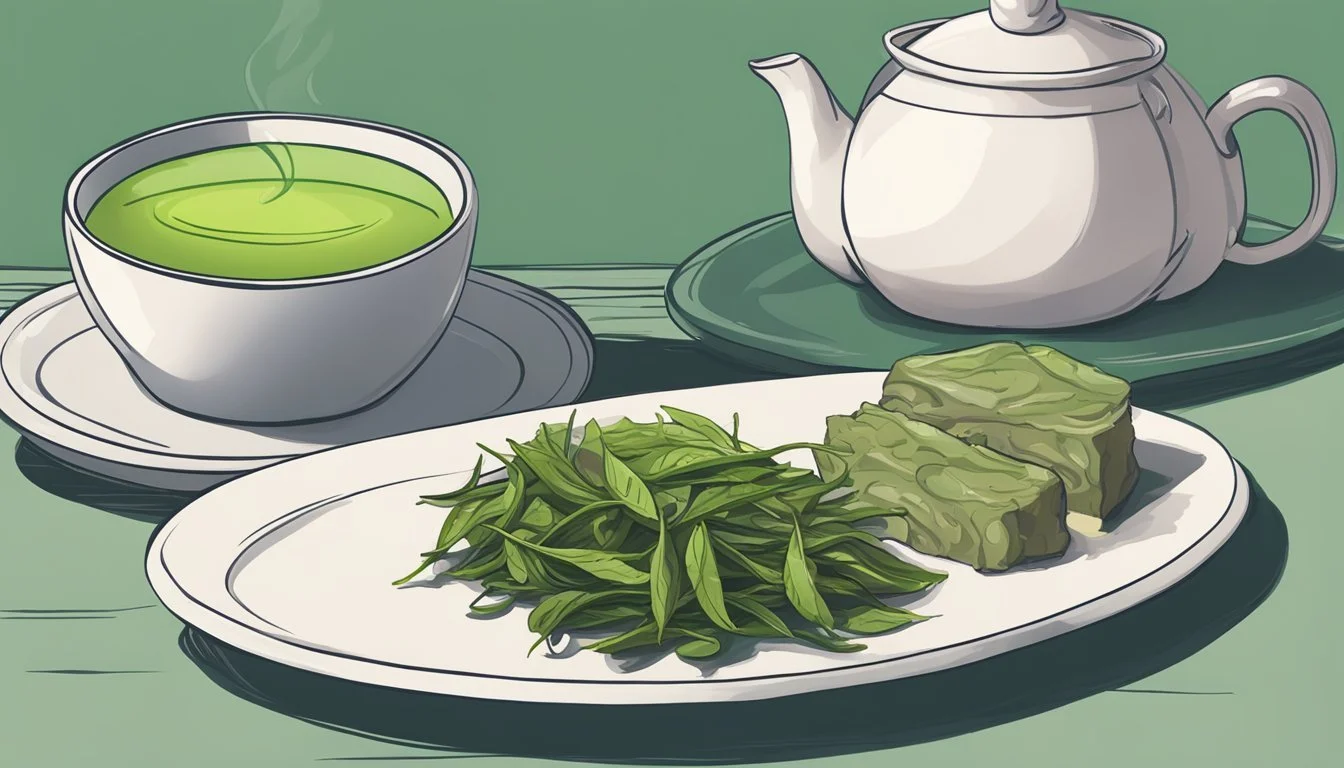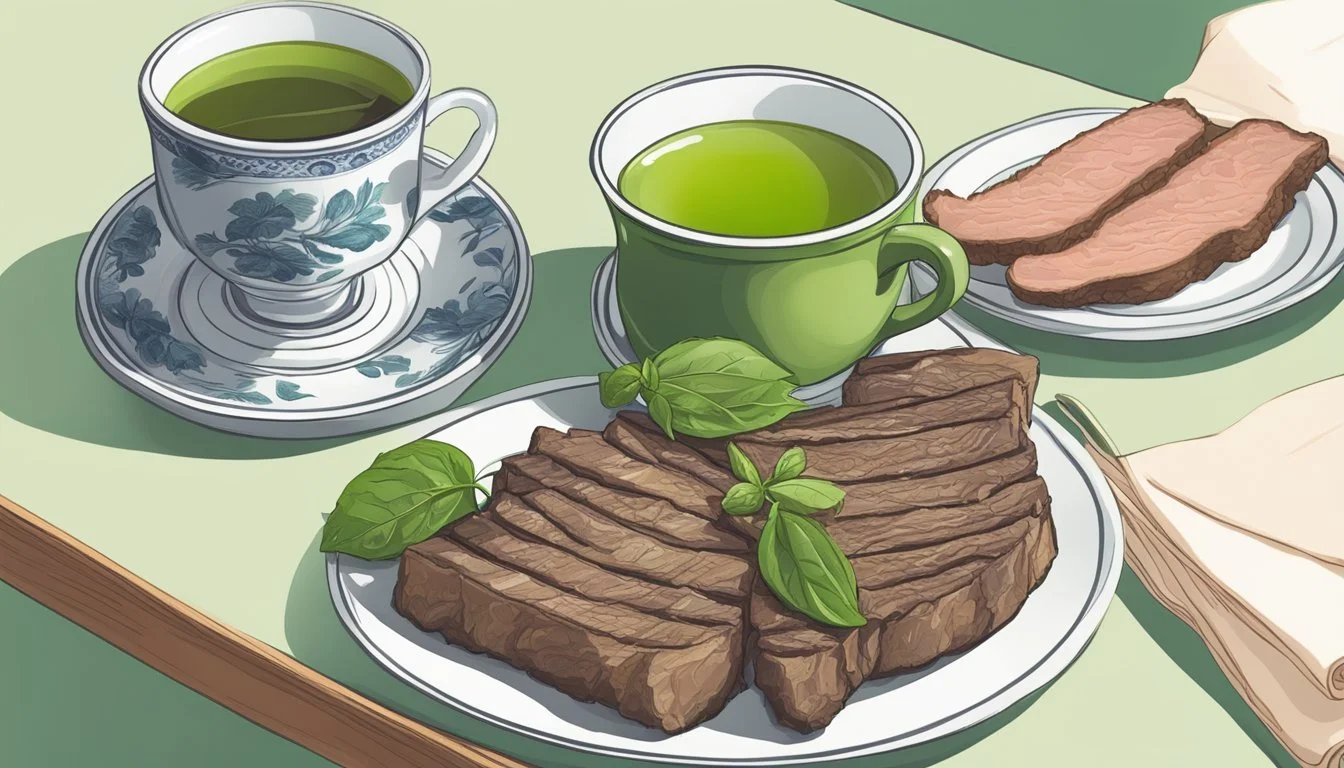Green Tea on Carnivore Diet
Benefits and Considerations
The carnivore diet is a regimen that emphasizes the consumption of animal products and typically excludes plant-based foods. As a strict all-meat diet, it is often debated whether beverages like green tea, which is derived from a plant, have a place in this dietary framework. The approach of the carnivore diet is rooted in the belief that human beings thrived historically on animal foods, and that modern health issues are often the result of a departure from this ancestral eating pattern.
Green tea, known for its potential health benefits, including antioxidant properties and a modest caffeine content, presents an interesting case for those following a meat-only diet. While some proponents of the carnivore diet argue for the inclusion of certain non-animal products such as tea for their potential health benefits, others advocate for a more purist interpretation, which would exclude such items. The inclusion of green tea, among other beverages, is a topic of ongoing discussion within the carnivore diet community.
Assessing the compatibility of green tea with the carnivore diet requires an examination of the underlying principles of the diet and the individual goals of the person adhering to it. While the carnivore diet is primarily focused on animal meats, fats, and organs, the allowance for plant-derived beverages like green tea is subject to personal discretion and interpretation of dietary guidelines. The choice to include green tea may align with some followers' flexible approach to the carnivore diet, while for others, strict adherence to animal products remains paramount.
Understanding the Carnivore Diet
This section provides detailed insights into the nature of the carnivore diet, outlining what it encompasses, its potential benefits against the challenges it presents, and the range of foods it includes.
Defining a Carnivore Diet
The carnivore diet is a restrictive regimen that exclusively comprises animal products. Emphasis is placed on high intakes of proteins and fats while eliminating all plant-based foods. This diet is often adopted for its simplicity and the belief in the benefits of consuming complete proteins and healthy fats found in animal products.
Benefits and Challenges
Proponents of the carnivore diet claim a variety of benefits including improved weight management and reduced inflammation due to high levels of saturated fats and cholesterol. This dietary pattern may lead some into ketosis, a state where the body burns fat for fuel. However, challenges include potential deficiencies in vitamins and minerals, that are typically obtained from plant sources, and the need for careful hydration management.
Foods Included in the Diet
A strict carnivore diet includes:
Meat: All types, including bacon
Seafood: Fish, shellfish, and other marine animals
Organs: Liver, kidney, and other offal for nutrient density
Eggs: A source of complete proteins and healthy fats
Dairy: Milk, cheese, and other high-fat dairy products
Tailoring the diet can vary and some less strict "animal-based" diets might include limited amounts of other food groups like certain fruits or honey to increase variety and nutrient intake.
Green Tea: Overview and Properties
Green tea is recognized for its distinctive qualities, including its content of antioxidants and caffeine, as well as its potential health benefits.
What is Green Tea?
Green tea originates from the leaves of the Camellia sinensis plant. It undergoes minimal oxidation during processing, thus retaining the green color of its leaves. Unlike black tea, green tea's production avoids the fermentation process, which preserves the natural compounds within the leaves.
Health Benefits of Green Tea
Green tea contains high levels of polyphenols, a type of antioxidant. These compounds, which include catechins, are believed to contribute to the reduction of inflammation and help protect against some chronic conditions. Studies have linked green tea consumption to a variety of health benefits, including improving heart health, aiding in metabolism, and possibly reducing the risk of cancer.
Green Tea Caffeine Content
The caffeine content in green tea is generally lower than that found in coffee but varies depending on brewing time and the variety of the tea. Typically, an 8 oz (about 237 ml) cup of green tea contains approximately 30-50 mg of caffeine. Green tea also provides tannins, which can moderate the body’s absorption of caffeine, leading to a more sustained energy release compared to the fast spike offered by other caffeinated drinks.
Incorporating Beverages on a Carnivore Diet
When adopting a carnivore diet, understanding the role of beverages is crucial, as liquid intake is essential to maintaining hydration and electrolyte balance.
Suitable Beverages on Carnivore Diet
Water is the cornerstone of hydration on any diet. Bone broth, rich in minerals and electrolytes, is another excellent choice for those following a carnivore diet. Milk provides calcium and vitamin D but should be consumed in moderation due to its sugar content. When it comes to zero-calorie options, sparkling water can be a refreshing alternative, though plain water is always preferred. Caffeinated beverages like coffee and certain teas can also be included, though some purists may exclude them due to their plant origins.
Beverage Considerations
Water
Considerations: Essential for life and hydration
Bone Broth
Considerations: High in nutrients and electrolytes, sourced from animals
Milk
Considerations: Contains calcium and vitamin D, consume in moderation
Coffee
Considerations: Plant-derived, contains caffeine
Green Tea vs. Other Teas
Green tea stands out in its minimal processing and high antioxidant content. However, those strictly adhering to a carnivore diet might avoid it due to its plant-based origin. Other teas like black, white, and oolong vary in oxidation levels but all contain caffeine. Herbal teas are not true teas but infusions of herbs and spices, and while some find them acceptable, they are typically avoided on a strict carnivore diet.
Tea Profiles: Oxidation Level, Caffeine Content, and Carnivore Diet Consideration
Green Tea
Oxidation Level: Minimal
Caffeine Content: Moderate
Carnivore Diet Consideration: May not be optimal due to plant origin
Black Tea
Oxidation Level: High
Caffeine Content: High
Carnivore Diet Consideration: Contains more caffeine
White Tea
Oxidation Level: Low to None
Caffeine Content: Low
Carnivore Diet Consideration: Least processed of traditional teas
Oolong Tea
Oxidation Level: Variable
Caffeine Content: Variable
Carnivore Diet Consideration: Middle ground between green and black
Herbal Tea
Oxidation Level: None
Caffeine Content: None
Carnivore Diet Consideration: Often avoided due to non-animal origin
Hydration and Electrolyte Balance
Hydration is critical for all bodily functions and the carnivore diet necessitates careful attention to fluid intake. Electrolytes like sodium, potassium, and magnesium are vital for muscle function and are often adequately supplied by meat. Supplementing with extra minerals may be required, particularly during the initial adaptation phase to ensure adequate electrolyte balance. Beverages like bone broth or mineral water can help maintain this balance, especially after extended periods of exercise or sweating.
The Compatibility of Green Tea with Carnivore Diet
The carnivore diet typically excludes plant-based foods, yet green tea may present a unique case for consideration due to its potential health benefits and minimal macronutrient content.
Can You Drink Green Tea on a Carnivore Diet?
Green tea is a plant-derived beverage that contains minimal calories and carbohydrates. Proponents of the carnivore diet focus on consuming animal products, but some allow for the inclusion of green tea due to its low macronutrient profile and hydration benefits. It's notable that green tea's subtle presence of carbohydrates does not typically interfere with the meat-centric nature of the diet.
Impact of Green Tea on Carnivore Diet Outcomes
The intake of green tea may interact with the carnivore diet's outcomes in several ways:
Weight Loss: Green tea has been associated with modest weight loss benefits due to its metabolism-boosting properties.
Hydration: It serves as a hydrating beverage option that may support the dietary focus on animal-based foods.
Digestive Issues: Green tea possesses anti-inflammatory properties that may alleviate digestive distress, though its impact may vary among individuals.
Nutrient Impact: While green tea provides very few nutrients, it does not significantly disrupt the nutrient intake central to the carnivore diet's philosophy.
Ingesting green tea might offer an additional choice for individuals on this diet, provided it aligns with their dietary preferences and goals.
Conclusion
In this final section, the relationship between green tea consumption and adherence to a carnivore diet is distilled into two subsections: a summary of the discussed points, and final recommendations based on current understanding.
Summary of Key Points
The carnivore diet is centered around animal products, excluding plant foods.
Green tea is a plant-based beverage, typically not included in strict carnivore diet guidelines.
Acknowledged health benefits of green tea include its antioxidant properties and potential disease prevention qualities.
Final Recommendations
Individuals following a strict carnivore diet should avoid green tea to remain within the diet's parameters.
For those who opt for a modified carnivore approach, inclusion of green tea could be considered for its health benefits, but it should be consumed in moderation.
Appendices
This section provides a comprehensive overview focusing on the constituents of green tea and useful resources tailored for individuals following the carnivore diet.
Detailed Analysis of Green Tea Components
Green tea, derived from the Camellia sinensis plant, contains a rich spectrum of polyphenols which are known to have antioxidant properties. These compounds, along with other micronutrients present in green tea, can influence metabolism. Prominent among these polyphenols are catechins like epigallocatechin gallate (EGCG), which have been studied for their potential health benefits.
Key Components:
Catechins: EGCG, EGC, ECG, EC.
Amino Acids: L-theanine.
Minerals: Fluoride, manganese.
Vitamins: B, C, E.
Significance:
The antioxidants present may play a role in neutralizing free radicals, although their impact within the context of a carnivore diet warrants further investigation given the exclusion of plant-based foods.
Resources for Carnivore Diet Followers
Individuals on the carnivore diet primarily consume animal products, so resources are tailored to emphasize maintaining a balanced intake of essential nutrients mostly derived from animal sources.
Resource List:
Guides: To ensure adequate nutrition while foregoing plant-derived substances such as polyphenols.
Support Groups: For shared experiences and tips on managing a carnivore diet.
Scientific Literature: Analyzing the impacts of excluding dietary antioxidants and polyphenols.
Utility:
Provides an evidence-based approach to diet formulation and highlights the importance of careful consideration of the diet’s nutritional completeness.
References
All Things Carnivore: This source discusses the strict adherence to animal-source foods on the carnivore diet and mentions that despite tea being a plant food, there may be some individuals who choose to include it for variety.
Wild Lumens: They provide a perspective on the carnivore diet as an elimination diet and suggest removing all plant-based beverages for optimal results. However, this source also acknowledges the potential health benefits of tea, including its impact on cholesterol levels.
Drinks on the Carnivore Diet: This source advises against the consumption of tea on the carnivore diet, positioning it as counter to personal preferences and the diet's philosophy.
In constructing the article, the author utilizes these references to capture a range of perspectives. They highlight potential benefits and drawbacks associated with the inclusion of green tea in the carnivore diet and ensure all information remains accurate and in compliance with the carnivore diet's principles.
About the Author
The author of this article is a seasoned nutritionist with a background in dietary science and a particular interest in specialized diets. She possesses a BSc in Nutrition and Dietetics and has spent over a decade consulting on various diet plans, focusing on evidence-based approaches to health and wellness.
During her professional journey, she has contributed to several health publications and has often addressed the complexities of restrictive diets, including ketogenic, paleo, and carnivore diets. Her approach to writing is characterized by a commitment to clarity and accuracy, ensuring that readers receive information that is not only informative but also practical in their dietary pursuits.
Experience:
Over 10 years in nutrition consulting
Specializes in therapeutic diets
Education:
Bachelor of Science in Nutrition and Dietetics
Expertise:
Ketogenic Diet
Carnivore Diet
Paleo Diet
In her analyses, she emphasizes the importance of personalization in diet, considering individual health goals and medical backgrounds. Her examination of green tea in the context of the carnivore diet is informed by her deep understanding of nutritional biochemistry and contemporary dietary patterns. She writes with a tone that conveys confidence and knowledge, aiming to demystify diet-related controversies.
Her dedication to ongoing research in the field of nutrition reflects in her balanced view on topics such as the inclusion of beverages like green tea in highly specific diets. Her insights are guided by the latest scientific findings, steering clear of unsupported claims and focusing on what is known and substantiated in the realm of nutritional science.







